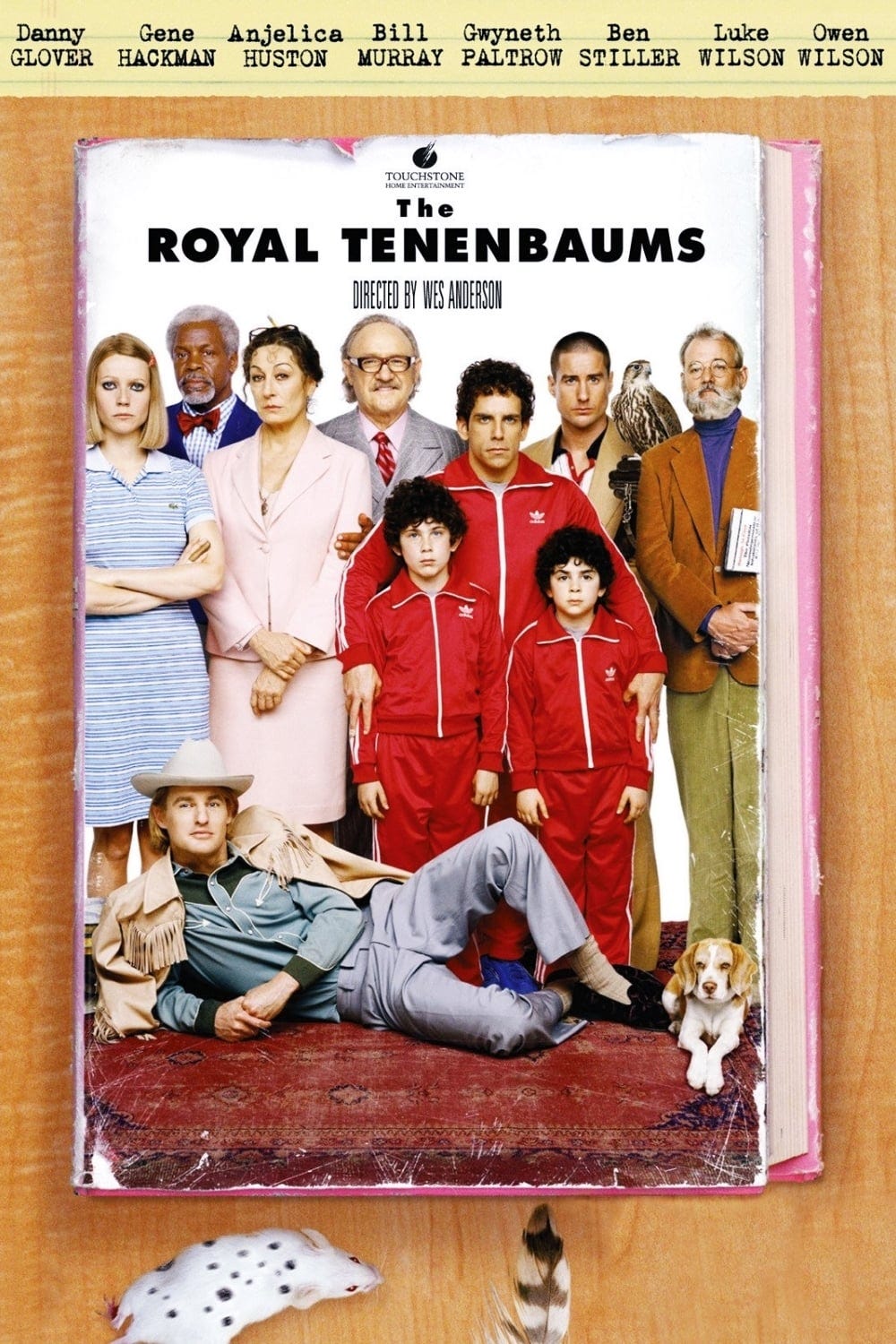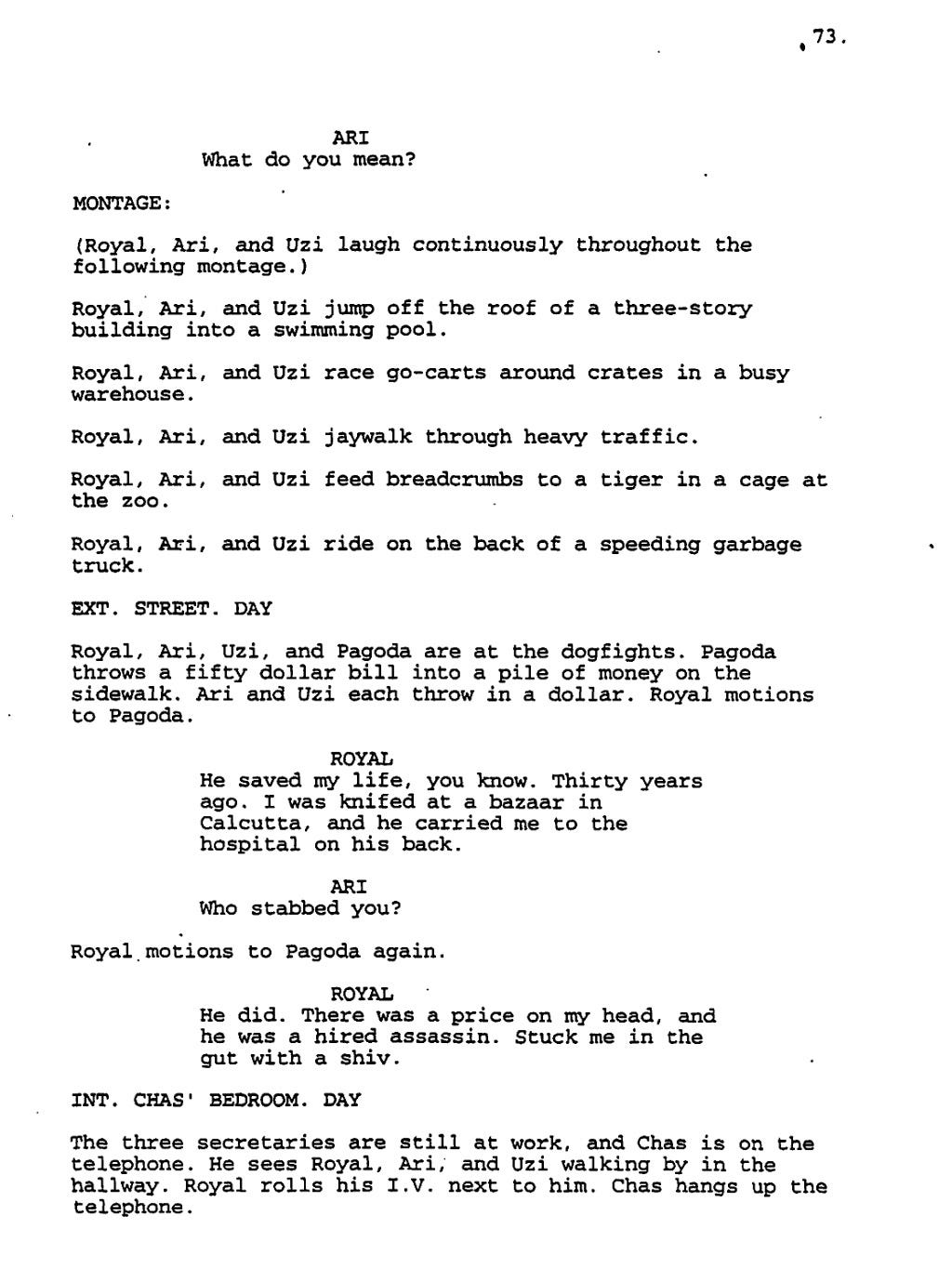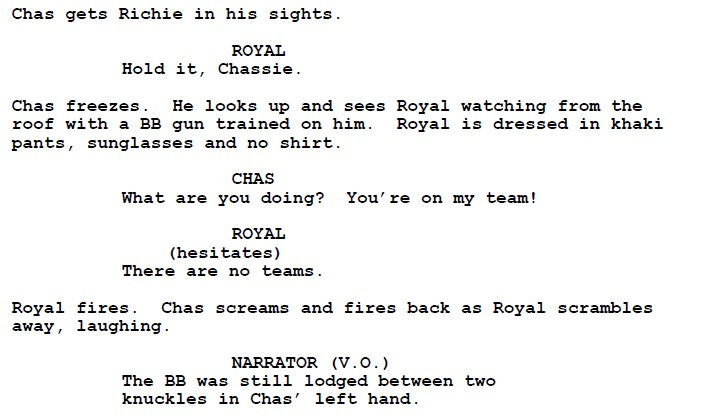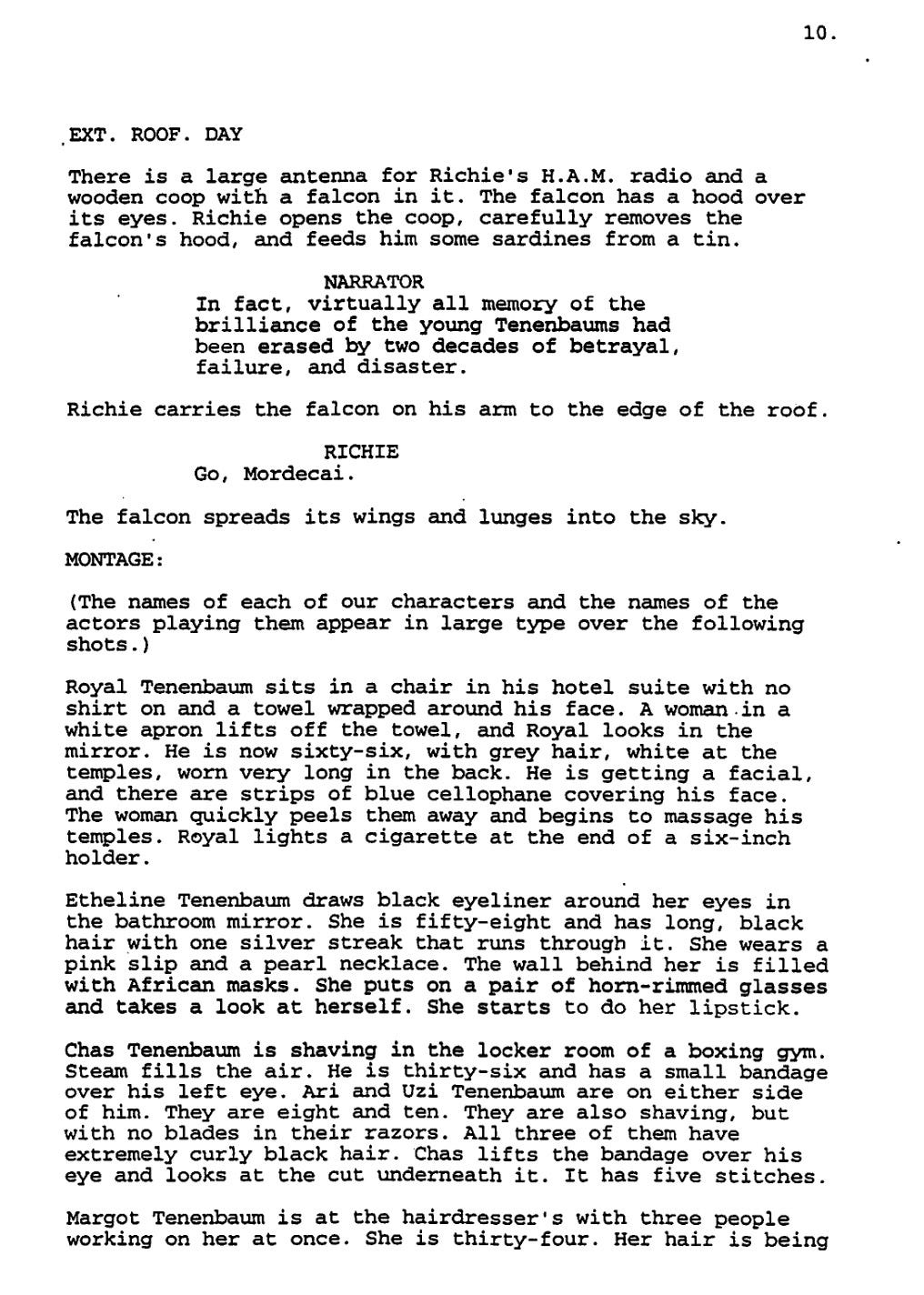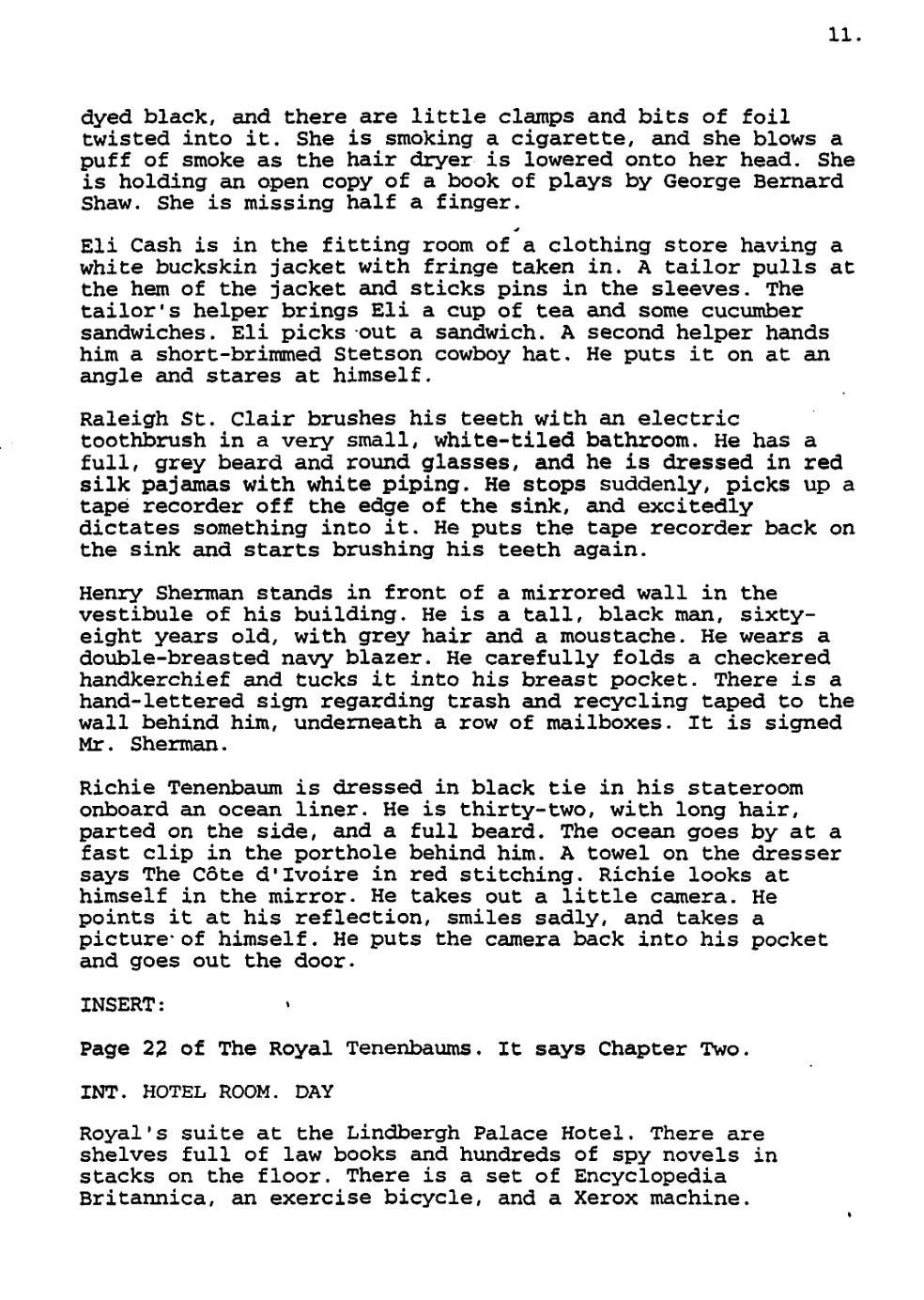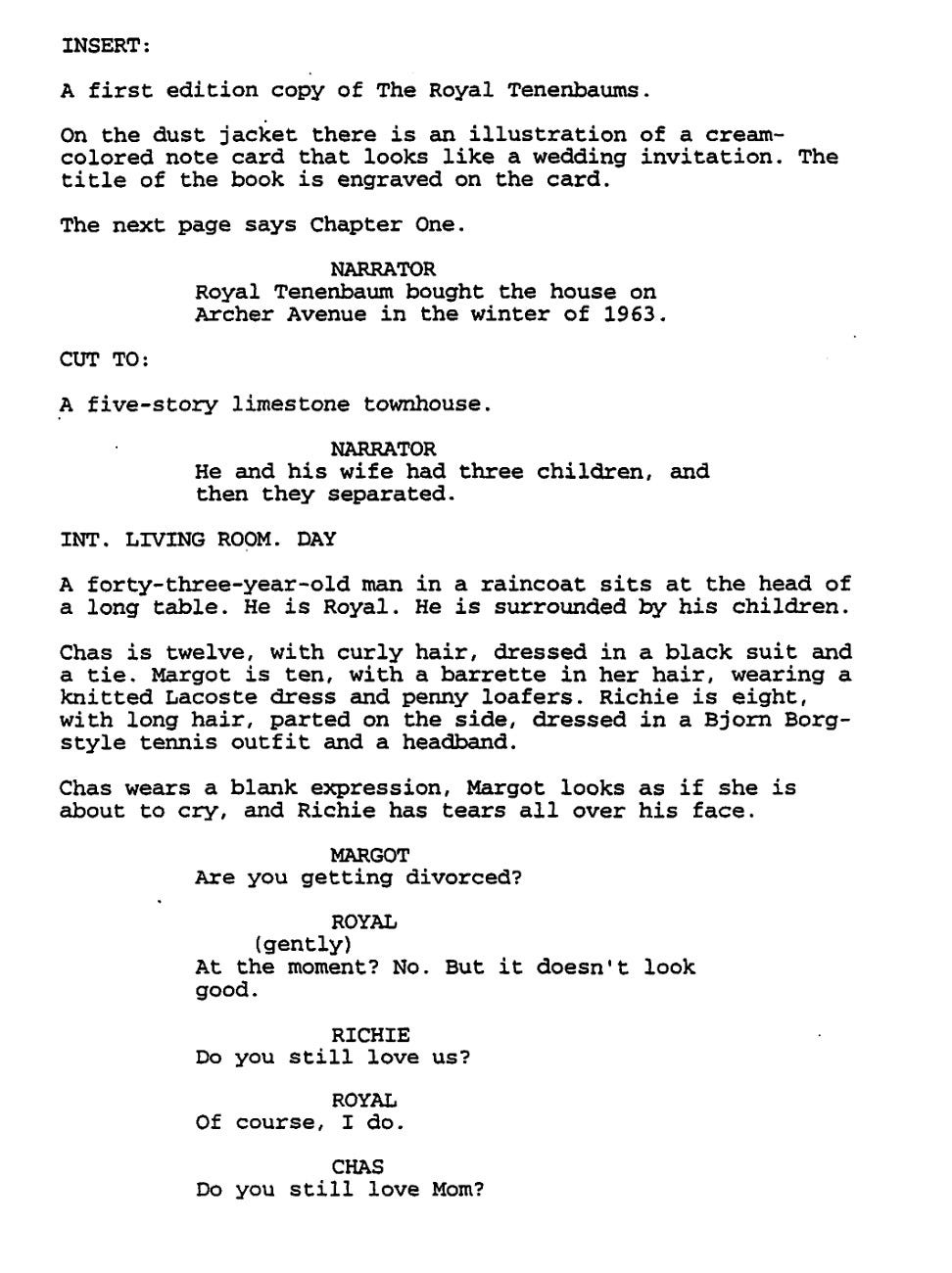The Royal Tenenbaums (2001) Script Review | #14 WGA 101 Greatest Scripts of the 21st Century
A mostly engrossing and quirky story about a dysfunctional family.
Logline: When three eccentric child prodigies and their mother share a home, their estranged father, Royal, returns with hopes of mending the fractured bonds of their extraordinary family..
Written by: Wes Anderson, Owen Wilson
Pages: 124
Full disclosure: I’ve not watched The Royal Tenenbaums; my opinions are based entirely on what I see on the page, though a little research indicates that this is as close to or even the final draft.
An aching current of sadness runs through The Royal Tenenbaums. Wes Anderson’s third— and to date, final— collaboration with Owen Wilson about an eccentric family is heavily influenced by Louis Malle’s The Fire Within as well as Orson Welles’ The Magnificent Ambersons; the script’s title is an homage to the latter.
Five plots unfold concurrently. The Tenenbaum patriarch, Royal, wishes to return home and reconcile with his separated wife, Etheline, only to discover she is drawn to her friend and business manager, Henry Sherman. The children, Richie, Margot, and Chas return home, each mired in their own unhappiness. Richie is in love with his adopted sister, Margot; Margot is having an affair with Richie’s friend, writer Eli Cash; and Chas is a single-parent to Ari and Uzi, and extremely paranoid after their mother’s death. To win back the affections of his family— and to know his grandsons better—Royal fakes an illness in order to stay in the house. I guess Leo Tolstoy was right: every unhappy family is unhappy in their own way. The problems of the Tenenbaums are certainly unlike most others.
In a move that would become a Wes Anderson trademark, the script is divided into eight chapters (note: Chapter Six is missing or not mentioned). Each chapter runs from 10 to 25 pages; rarely more or less.
Chapter One: 1-11
Chapter Two: 11-24
Chapter Three: 24-36
Chapter Four: 36-58
Chapter Five: 58-87 (this includes the missing sixth chapter)
Chapter Seven: 87-110
Chapter Eight: 110-124
The first half of the script covers Royal’s attempts to move into the house as well as Etheline’s and the adult children’s various dilemmas; the second half focuses on Royal’s actual efforts to be present for his family, though Chas and Margot are both skeptical. He is an entertaining grandfather to Uzi and Ari…
He tries to dissuade Margot from continuing her affair with Eli, and tries to reconcile with Chas, who has never forgiven him for shooting him in the hand…
He does try to create a rift between Etheline and Henry, though, which is one of his less honorable moments. His illness deception is eventually uncovered, but by then, Royal has truly become sincere. A family, torn at the beginning, gradually comes together by the end.
Although this is an ensemble affair, Anderson considers Richie to be the script’s “center.” This choice makes sense in a fashion— Richie is the only one who puts up with Royal and keeps the peace. He also has the most tragic arc, which includes a suicidal attempt and a sad decision where he and Margot decide to keep their love a secret.
What ails the children? Well, all three are failed child prodigies. Chas was into business at a very young age, seeming to have a knack for international finance; Margot wrote plays, winning a grant of fifty thousand dollars in the ninth grade; Richie was a champion tennis player. But as adults, they’re more or less aimless. All of this is covered in Chapter One, which is essentially the setup. For the record, I admire Anderson and Wilson’s boldness to spend a paragraph each on pages 10-11 describing and introducing the characters as adults.
Anderson initially wanted to write a script based on a book that did not exist. He also wanted to address his parents’ divorce— it’s no coincidence that Etheline is an archaeologist, just as Anderson’s mother was. But the moment he sat down to work on the screenplay and Royal began to speak, that initial impetus changed. Soon enough, Anderson and Wilson moved away from the biographical elements of the former’s childhood and turned into something else. The three child prodigies, for instance, are a homage to the titular characters in J.D. Salinger’s Franny and Zooey; meanwhile, Anderson borrowed the aristocratic-sounding name, Tenenbaum, from a collage friend.
The Royal Tenenbaums also borrows a technique I’ve only seen in the early Disney pictures made during Walt Disney’s time, in which the script opens with a book being opened and a narrator easing us into the world we are about to read.
The narrator, who occupies most of Chapter One, disappears until page 121; the effect is similar to that of reading a fairytale, except one that is about the decline of a once-great family, and the effects of failure on people gifted at an extremely early age that never went anywhere when they grew older.
The writing style is worth examining. Like in The Grand Budapest Hotel (#25 on the WGA List of 101 Greatest Screenplays of the 21st Century), it does not use camera moves or directions to draw attention to Anderson’s distinctive visual style. This makes it easy to read. The screenplay has a droll wit, and moves at a fair pace.
I’m not entirely convinced that The Royal Tenenbaums should be ranked higher than The Grand Budapest Hotel on this list; but hey, I don’t make the rules. On its own merits, The Royal Tenenbaums is remarkably inventive. Unabashed in its cinematic and literary influences, funny and sad in equal measure, this might be some of Anderson and Wilson’s most personal work.
Notes:
Erbland, Kate (May 24, 2012) | 30 Things We Learned From ‘The Royal Tenenbaums’ Commentary (Film School Rejects)
Seitz, Matt Zoller (October 7, 2013) | How Wes Anderson Made The Royal Tenenbaums (Vulture)
Morgan, Kim (April 1, 2010) | Six Stories: Salinger Inspired Cinema (HuffPost)
Hutchinson, Sean (December 14, 2016) | 28 Things You Might Not Have Known About The Royal Tenenbaums (Mental Floss)
Bietette, Nicole (June 17, 2016) | 15 little known facts about Wes Anderson’s ‘The Royal Tenenbaums’ (NY Daily News)



